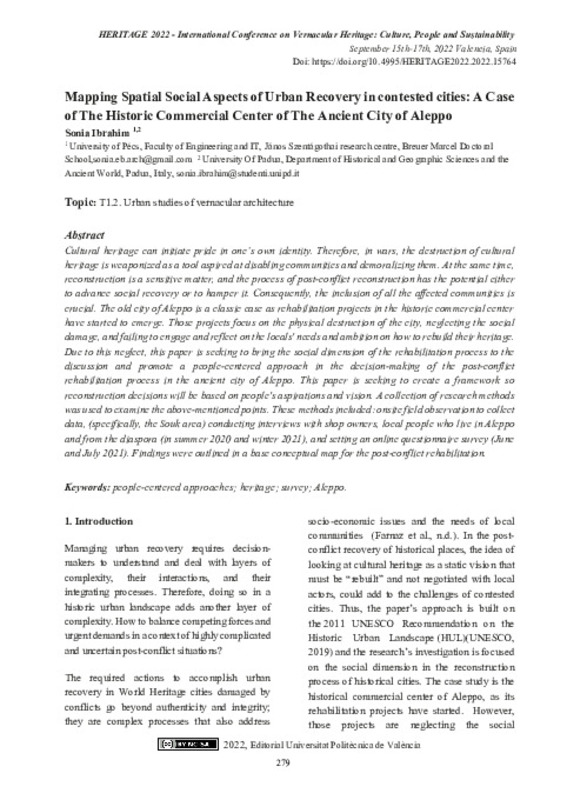JavaScript is disabled for your browser. Some features of this site may not work without it.
Buscar en RiuNet
Listar
Mi cuenta
Estadísticas
Ayuda RiuNet
Admin. UPV
Mapping Spatial Social Aspects of Urban Recovery in contested cities: A Case of The Historic Commercial Center of The Ancient City of Aleppo
Mostrar el registro sencillo del ítem
Ficheros en el ítem
| dc.contributor.author | Ibrahim, Sonia
|
es_ES |
| dc.coverage.spatial | east=37.1342603; north=36.2021047; name=Aleppo, Siria | es_ES |
| dc.date.accessioned | 2022-11-02T13:21:14Z | |
| dc.date.available | 2022-11-02T13:21:14Z | |
| dc.date.issued | 2022-09-13 | |
| dc.identifier.isbn | 9788413960203 | |
| dc.identifier.uri | http://hdl.handle.net/10251/189015 | |
| dc.description.abstract | [EN] Cultural heritage can initiate pride in one’s own identity. Therefore, in wars, the destruction of cultural heritage is weaponized as a tool aspired at disabling communities and demoralizing them. At the same time, reconstruction is a sensitive matter, and the process of post-conflict reconstruction has the potential either to advance social recovery or to hinder it. Consequently, the inclusion of all the affected communities is crucial. The old city of Aleppo is a classic case as rehabilitation projects in the historic commercial center have started to emerge. Those projects focus on the physical destruction of the city, neglecting the social damage, and failing to engage and reflect on the locals' needs and ambition on how to rebuild their heritage. Due to this neglect, this paper is seeking to bring the social dimension of the rehabilitation process to the discussion and promote a people-centered approach in the decision-making of the post-conflict rehabilitation process in the ancient city of Aleppo. This paper is seeking to create a framework so reconstruction decisions will be based on people's aspirations and vision. A collection of research methods was used to examine the above-mentioned points. These methods included: onsite field observation to collect data, (specifically, the Souk area) conducting interviews with shop owners, local people who lives in Aleppo and from the diaspora (in summer 2020 and winter 2021), and setting an online questionnaire survey (June and July 2021). Findings were outlined in a base conceptual map for the post-conflict rehabilitation. | es_ES |
| dc.format.extent | 8 | es_ES |
| dc.language | Inglés | es_ES |
| dc.publisher | Editorial Universitat Politècnica de València | es_ES |
| dc.relation.ispartof | Proceedings HERITAGE 2022 - International Conference on Vernacular Heritage: Culture, People and Sustainability | |
| dc.rights | Reconocimiento - No comercial - Compartir igual (by-nc-sa) | es_ES |
| dc.subject | People-centered approaches | es_ES |
| dc.subject | Heritage | es_ES |
| dc.subject | Survey | es_ES |
| dc.subject | Aleppo | es_ES |
| dc.title | Mapping Spatial Social Aspects of Urban Recovery in contested cities: A Case of The Historic Commercial Center of The Ancient City of Aleppo | es_ES |
| dc.type | Capítulo de libro | es_ES |
| dc.type | Comunicación en congreso | es_ES |
| dc.identifier.doi | 10.4995/HERITAGE2022.2022.15764 | |
| dc.rights.accessRights | Abierto | es_ES |
| dc.description.bibliographicCitation | Ibrahim, S. (2022). Mapping Spatial Social Aspects of Urban Recovery in contested cities: A Case of The Historic Commercial Center of The Ancient City of Aleppo. En Proceedings HERITAGE 2022 - International Conference on Vernacular Heritage: Culture, People and Sustainability. Editorial Universitat Politècnica de València. 279-286. https://doi.org/10.4995/HERITAGE2022.2022.15764 | es_ES |
| dc.description.accrualMethod | OCS | es_ES |
| dc.relation.conferencename | HERITAGE2022 International Conference on Vernacular Heritage: Culture, People and Sustainability | es_ES |
| dc.relation.conferencedate | Septiembre 15-17, 2022 | es_ES |
| dc.relation.conferenceplace | Valencia, España | es_ES |
| dc.relation.publisherversion | http://ocs.editorial.upv.es/index.php/HERITAGE/HERITAGE2022/paper/view/15764 | es_ES |
| dc.description.upvformatpinicio | 279 | es_ES |
| dc.description.upvformatpfin | 286 | es_ES |
| dc.type.version | info:eu-repo/semantics/publishedVersion | es_ES |
| dc.relation.pasarela | OCS\15764 | es_ES |
| dc.contributor.funder | Università degli studi di Padova | es_ES |








